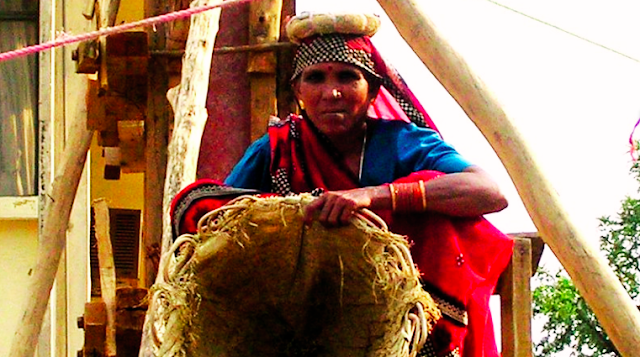
Keshav and Somvati are residents of a hut in Shahbad dairy colony of Delhi. When lockdown was announced in 2020, they were in Gujarat to work in a construction project. The closure was so sudden and placed them in such a difficult position in a new area where they had hardly any support that they took the extremely difficult decision if walking back to Delhi, a distance of around 700 km, with their two small children, that too without being able to collect their dues from employers.
Keshav says, “We walked on and on, often carrying the children on our shoulders or in our lap. Sometimes we got lifts for short distances. Whenever we found a langar ( free community kitchen), we would eat gratefully, but often we remained hungry.”
There was hardly any relief even after reaching their home in Delhi, utterly exhausted. Again they were dependent for quite some time on uncertain availability of food help from somewhere or the other.
A woman Ramvati of the same colony told an even more disturbing story about a neighbor, Sudha, a woman expecting her first child in a short while, who did not have any means of subsistence when the lockdown was announced.
With all transport disrupted, when her male family members decided to walk back to their village in Mahoba, a distance of around 500 kms. or so, she also walked with them. However even after reaching the village with highly swollen feet, they had to be quarantined in a nearby school building with poor food and other facilities.
These may be some stories of extreme distress and difficulties, but even the situation more generally has been a very difficult one for construction workers in recent times, as came out clearly in recent conversations with them.
Starting with demonetization days, has your life improved or deteriorated during the last six years or so?
This was one of the main questions I put to nearly 50 construction workers of Delhi, almost an equal number of women and men.
Their answers were remarkably similar in the main point they made — there has been a definite deterioration in their income and living conditions. The most frequent answer was along these lines — demonetization with its disruption, unemployment and hunger started a trend of deterioration which peaked during COVID and its lockdowns and we have still not emerged from this distress.
Quite apart from the complete disruption of life and livelihood caused by demonetization and COVID as well as its exceptionally stringent lockdowns, the more continuing reality during these six years has been that of almost entirely stagnant wages, while prices have continued to increase rapidly, particularly with respect to such essentials of everyday life as pulses, vegetables and cooking gas.
In addition the complete loss of livelihood over prolonged periods (including pollution related shutdown of construction work in recent years) has led to accumulation of increased debts with high rates of interest. This debt has become an increasing burden and source of tensions.
Demonetization with its disruption, unemployment and hunger started a trend of deterioration
In such a precarious situation, those who do not have huts or other housing have to grapple with the problem of paying timely rent. This rent can range from Rs 1,200 to Rs 2,500 for a very small dwelling place. Secondly, those who do not have ration cards face a much higher burden of buying all their food grain in the non-subsidized open market at many times the subsidized rate. Then there are others who have several family members left out of ration card entries.
If both husband and wife work as construction workers, they can together earn Rs 600 to Rs 1,000 in a day, and with employment generally only available for about 15 days in a month in reasonably good times, the monthly income of a two earners family can range from Rs 9,000 to Rs 15,000 from which travel. But to calculate proper average, we must add the various periods of prolonged disruption when there is almost complete loss of earning for long periods and the resulting unemployment.
In addition, lack of basic utilities results in additional expenditure. In JJ Bawana lack of toilets results in people paying Rs 5 per toilet visit, and lack of potable water results in having to pay Rs 20 for a can of water. Faulty meters or other factors can lead to excessive billing, despite the announced subsidy and exemption in electricity supply, people complain.
In this situation the untimely death of the main earning member, a serious illness, injury or accident can result in indebtedness and poverty from which it is difficult to come out for years, if at all.
Despite the high nutrition needed by these workers who toil a lot in difficult conditions for long hours, chronic malnutrition and even hunger very clearly exist in several of these households and this situation has been worsening during the last six years or so, a time of stagnant wages, increasing prices and more disruptions.
*Honorary Convener, Campaign to Save Earth Now. His recent books include ‘Planet in Peril’, ‘When the Two Streams Met’ and ‘A day in 2071’
Courtesy: https://www.counterview.net